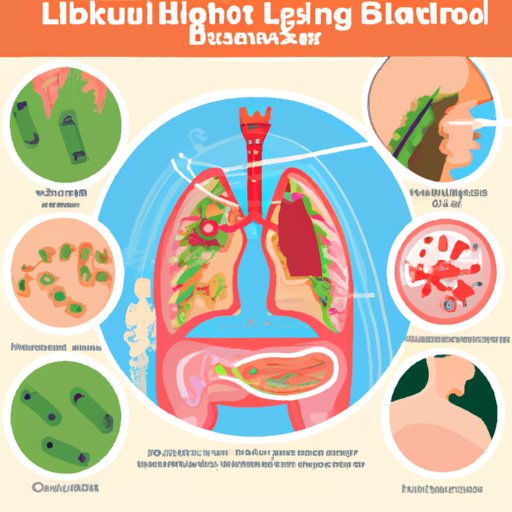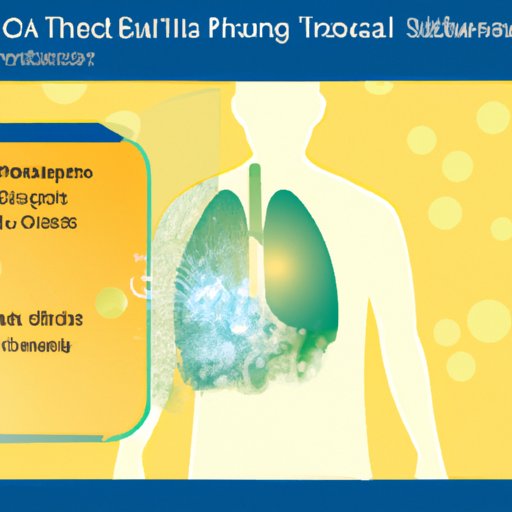
I. Introduction
If you’re experiencing persistent cough, fever, or shortness of breath, you may be suffering from a bacterial lung infection. These infections can be serious and even life-threatening if left untreated. In this comprehensive guide, we’ll explore the symptoms, causes, diagnosis, treatment, and prevention of bacterial lung infections and their impact on overall health. We’ll also cover coping strategies for patients, ongoing research developments, and the link between bacterial lung infections and other health conditions.
II. The Facts About Lung Infections Caused by Bacteria: Symptoms, Causes, and Treatment Options
Bacterial lung infections are caused by different types of bacteria that can affect the airways and lungs, leading to inflammation and other symptoms. The most common types of bacterial lung infections include pneumonia, bronchitis, and tuberculosis.
The symptoms of bacterial lung infections can vary depending on the type of infection, but may include a persistent cough, fever, chest pain, shortness of breath, fatigue, and loss of appetite. The causes of bacterial lung infections can also vary, but may include exposure to bacteria through inhaling contaminated air, close contact with an infected person, or weakened immune system.
If you suspect that you’re suffering from a bacterial lung infection, it’s important to seek medical attention promptly. The diagnosis of bacterial lung infections typically involves a physical exam, chest X-ray, blood test, sputum culture, and other lab tests. Depending on the severity of the infection, treatment options may include antibiotics, oxygen therapy, or hospitalization.

III. The Impact of Bacterial Lung Infections on Overall Health: A Comprehensive Guide
Bacterial lung infections can have a significant impact on overall health, especially if left untreated or if the infection becomes chronic. If not properly treated, bacterial lung infections can lead to complications such as sepsis, respiratory failure, and lung abscesses. In some cases, the infection can also spread to other areas of the body, such as the heart or brain.
It’s important to take proactive measures to prevent bacterial lung infections, such as maintaining good hygiene, avoiding exposure to pollutants, quitting smoking, and getting vaccinated. If you have a weakened immune system or other underlying health conditions, it’s especially important to be cautious and seek prompt medical attention if you experience any symptoms of a bacterial lung infection.
Long-term complications and side effects of bacterial lung infections may include difficulty breathing, chronic coughing, fatigue, and reduced quality of life. Proper treatment and follow-up care can help manage these symptoms and improve overall health.
IV. Preventing Bacterial Lung Infections: Tips and Tricks for Avoiding These Common Diseases
Preventing bacterial lung infections involves taking proactive measures to reduce exposure to bacteria and strengthen the immune system. These measures may include:
– Avoiding exposure to pollutants and irritants
– Quitting smoking
– Maintaining good hygiene practices, such as frequent hand washing
– Getting vaccinated against preventable infections, such as pneumonia and flu
– Seeking prompt medical attention if experiencing any symptoms of a bacterial lung infection
It’s also important to be aware of potential risk factors, such as having a weakened immune system, being a smoker, or having frequent exposure to pollutants or irritants. By taking proactive steps to prevent bacterial lung infections, you can reduce your risk of developing these common diseases and improve your overall health.
V. Overcoming Bacterial Lung Infections: How to Live with a Chronic Illness
If you’ve been diagnosed with a chronic bacterial lung infection, such as tuberculosis, it’s important to take steps to manage your symptoms and improve your overall health. Lifestyle changes such as quitting smoking, eating a healthy diet, and getting plenty of rest can help improve the immune system and reduce symptoms.
You may also benefit from support and resources available for patients and their families, such as support groups or counseling services. It’s important to maintain regular follow-up care with your healthcare provider to monitor the infection and adjust treatment as needed.
VI. Research Developments for Bacterial Lung Infections: What You Need to Know
Ongoing research developments for bacterial lung infections are focused on developing more effective treatments and preventative measures. Innovations in treatment may include new antibiotics, immunotherapies, or targeted therapies that can directly attack the bacteria causing the infection.
Research is also underway to develop new vaccines and diagnostic tools that can improve early detection and treatment of bacterial lung infections. Promising developments in research offer hope for new and innovative treatments for bacterial lung infections in the future.
VII. Living with Bacterial Lung Infections: Coping Strategies from Patients and Healthcare Professionals
If you’re living with a bacterial lung infection, it can be helpful to hear from other patients and healthcare professionals who have experience managing the condition. Support groups or online communities can provide a valuable source of information and advice, as well as emotional support.
Healthcare professionals can also offer guidance and advice on managing symptoms, such as providing breathing exercises or prescribing medications. By working closely with your healthcare team and seeking support from others in similar situations, you can develop effective coping strategies and improve your overall quality of life.
VIII. The Link Between Bacterial Lung Infections and Other Health Problems: A Look at the Science
Studies have shown that bacterial lung infections may increase the risk of developing other health conditions, such as COPD, lung cancer, or cardiovascular disease. The link between bacterial lung infections and these conditions is still being studied, but may be related to inflammation or damage to the lungs caused by the infection.
If you have a bacterial lung infection, it’s important to seek prompt medical attention and proper treatment to reduce the risk of developing other health problems. By taking proactive steps to manage the infection and improve overall health, you can reduce the risk of developing complications and associated health risks.
IX. Conclusion
Bacterial lung infections can be serious and even life-threatening if left untreated. By understanding the symptoms, causes, diagnosis, treatment, and prevention of these infections, you can take proactive steps to improve your health and reduce your risk. From lifestyle changes to ongoing research developments, there are many strategies and resources available to help you manage bacterial lung infections and improve your quality of life.
Remember to seek medical attention promptly if you experience any symptoms of a bacterial lung infection, and to work closely with your healthcare team to develop effective treatment and prevention strategies. With proper care and management, you can overcome bacterial lung infections and improve your overall health and wellbeing.





